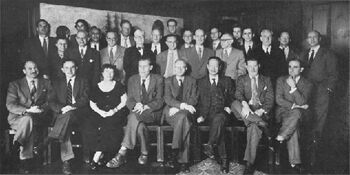Futures: Difference between revisions
| Line 10: | Line 10: | ||
==== Futures Research ==== | ==== Futures Research ==== | ||
In the European context, Futures research became formalised during and after the World Wars, | In the European context, Futures research became formalised during and after the World Wars, encouraged by intense collective efforts to anticipate and prepare for future military and geopolitical scenarios. Structured methods for long-term planning, systems thinking and strategic foresight were elaborated that emphasised prediction and control of future unknowns, attempting to minimise the threat of being blindsided by unforeseen events. | ||
Modern-day Futures studies considers a broad range of potential futures, including | Modern-day Futures studies considers a broad range of potential futures, including societal and environmental shifts and transformations in science and technology. The interdisciplinary Futures field includes ecology, sociology, economics, anthropology, history, philosophy, Indigenous research and political science, along with various creative practices across domains for exploring uncertain, complex emergence. Decolonial and More-than-Human perspectives challenge conventional foresight approaches, cultural and personal bias, and limiting frameworks and expectations, whilst practices like scenario planning, performative worlding and imaginative techniques work to expand and enrich envisioning futures, as well as planning and policymaking. | ||
==== Cybernetics ==== | ==== Cybernetics ==== | ||
Revision as of 01:44, 13 July 2024
Futures Introduction
Futures research, or futures studies, is a broad field that explores potential futures to better understand and prepare for possible changes and developments across various domains, including society, ecologies and technologies.
There are diverse approaches to Futures, but a key issue across all approaches is the inherent deep uncertainty of the future. This involves a fundamental ambiguity where the range of possible alternatives and outcomes can not be accurately predicted, preventing any clear assignment of probabilities. This uncertainty is particularly critical in the context of the current polycrisis, and the unprecedented challenges associated with climate change, economic instability, social inequality, geopolitical conflict and multi-species justice.
Ecological Knowledge
Indigenous understandings and ecological attention need to be at the beginning of the story of Futures: collaborative ecological knowledge played a vital role in sustainability and resilience across millennia. Understandings of ecological dynamics and potential futures held in Indigenous communities are deeply rooted in lived relationship with place: these relationships are characterised by reciprocal responsibilities and stewardship. Indigenous Knowledge Systems are not simply about observing the environment, the protocol includes maintaining and renewing relationships with nature and all living beings. [1]. Relational ways of being and knowing grow insight into natural cycles and long-term ecological changes, enabling Indigenous communities to make informed predictions and decisions about situations unfolding. [see Responsibility, Environmental Justice]
Futures Research
In the European context, Futures research became formalised during and after the World Wars, encouraged by intense collective efforts to anticipate and prepare for future military and geopolitical scenarios. Structured methods for long-term planning, systems thinking and strategic foresight were elaborated that emphasised prediction and control of future unknowns, attempting to minimise the threat of being blindsided by unforeseen events.
Modern-day Futures studies considers a broad range of potential futures, including societal and environmental shifts and transformations in science and technology. The interdisciplinary Futures field includes ecology, sociology, economics, anthropology, history, philosophy, Indigenous research and political science, along with various creative practices across domains for exploring uncertain, complex emergence. Decolonial and More-than-Human perspectives challenge conventional foresight approaches, cultural and personal bias, and limiting frameworks and expectations, whilst practices like scenario planning, performative worlding and imaginative techniques work to expand and enrich envisioning futures, as well as planning and policymaking.
Cybernetics
Cybernetics is the study of control and communication across animals and machines. Originating in the 1940s with Norbert Wiener, cybernetics framed the world as consisting of systems—biological and technical—exploring how systems regulate themselves through feedback loops, and examining the dynamics by which they maintain stability and achieve goals through adaptive mechanisms. Second-order cybernetics, developed in the 1970s by Heinz von Foerster, was extended by Gregory Bateson emphasising the integral role of the observer within systems. [2]. Bateson’s approach highlighted the subjectivity and reflexivity in understanding complex systems, and the connection between ecological, social, and mental systems.
Strategic Foresight
During the Cold War, the need to anticipate technological and geopolitical changes led to the refinement of Futures research. Strategic Foresight uses techniques like scenario planning and trend analysis to anticipate and influence future outcomes. Governments, businesses, and academic institutions adopted foresight techniques to better anticipate and prepare for a wider range of potential future disruptions amidst rapidly changing events and unpredictable developments. Unlike predictions and forecasting, Strategic Foresight made use of qualitative methods to navigate complex, volatile uncertainty and the “wicked problems” about the future.
Scenarios
Scenario Planning techniques provided an alternative to probabilistic forecasting and quantitative methods. Instead of estimating probabilities for events, scenario techniques generate multiple alternative scenarios, illustrating diverse pathways and possible futures. They are used to evaluate how strategies might perform under various hypothetical conditions, and to stress-test policies and ensure they are resilient and adaptable to different potential challenges. This approach helps develop robust policies that can be flexible in the face of uncertainty and effective across a wide range of situations.
Co-Design with Communities
Co-design promotes bottom-up processes as a means of addressing inclusion and actively welcoming citizen involvement and civic activism into research and design work. Originating from participatory design practices in 1970s Scandinavia, Co-Design invites communities, particularly stakeholders and those directly impacted, into the design processes itself. Co-design methods strive to apply collaborative techniques to both the questions about futures—working out what is needed—and also the design outcomes—how these needs are answered. Often employed in grassroots initiatives, Co-Design is used to engage communities in shaping communal spaces, infrastructure, as well as public policies and new democratic practices and urban governance methods in the hope of actively taking on board the real needs and preferences of people impacted. [See governance, citizens assemblies]
Decolonial Futures
Decolonial Futures can reference a whole variety of practices that emphasise plural futures and place-based imaginaries. This work is fed by the work of thinkers like Eduardo Viveiros de Castro, who advocate for considering plural, alternative futures rather than speaking about a general singular future for all. [3]. Methods emphasising Decolonial Futures include imaginative and embodied practices, listening and attuning to distinct place-based imaginaries, welcoming perspectives from the Global Majority, from disability work and feminist frameworks, challenging heteronormative and Euro-American biases in future scenario planning.
Performance and Rehearsing the Future
In the performance field and citizen theatre there is a varied culture of participatory creative social practice aimed at exploring societal transformations. These methods engage communities in performance-based activities that envision and rehearse possible futures, collaboratively getting to know collective challenges from the inside, and acting and improvising in response. Through techniques such as Augusto Boal’s Theatre of the Oppressed and other community-focused performance techniques, these practices aim to open up dialogue, grow relationships in community, and empower participants to shape and reflect upon alternative futures. [4].
LARPs
Live Action Role-Playing (LARP), developed by the Nordic LARP community is a playful, immersive and participatory method to engage diverse audiences in exploring contemporary societal challenges and future scenarios. It involves participants role-playing particular characters within time-based creative scenarios to explore different futures and outcomes, engaging audiences in group problem-solving and collective imagination.
Citations
- ↑ Kyle Powys Whyte, On the role of traditional ecological knowledge as a collaborative concept: a philosophical study. Ecol Process 2, 7, 2013. https://doi.org/10.1186/2192-1709-2-7
- ↑ Bateson, Gregory. Steps to an Ecology of Mind. University of Chicago Press, 1972
- ↑ Viveiros de Castro, Eduardo. "Exchanging Perspectives: The Transformation of Objects into Subjects in Amerindian Ontologies." In The Anthropology of Extinction: Essays on Culture and Species Death, edited by Genese Marie Sodikoff, Indiana University Press, 2012, pp. 169-191
- ↑ Boal, Augusto. 'Theatre of the Oppressed'. Pluto Press, 1979

